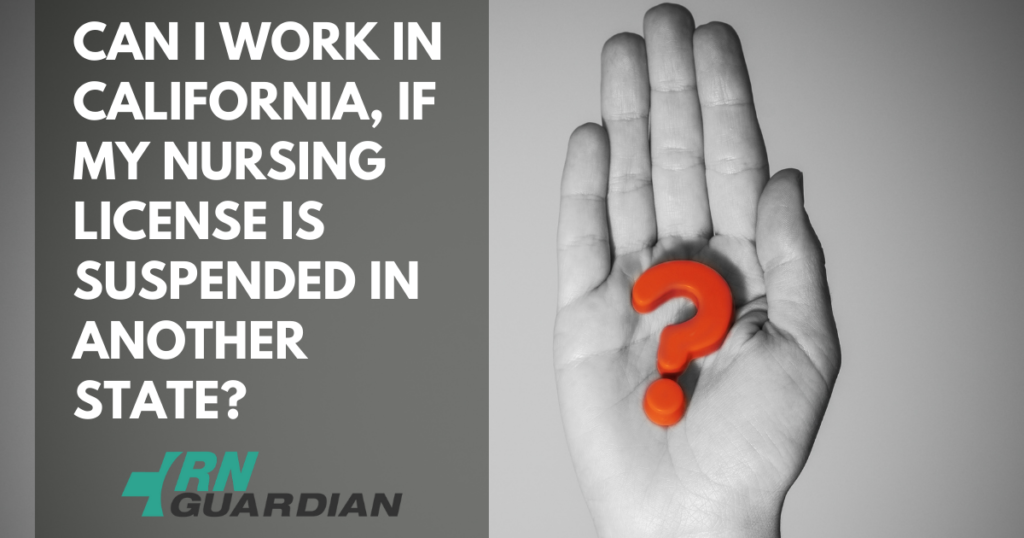
Can you apply for a nursing license in California if you have a suspended license in another state? Yes! But the process can be difficult to navigate. Here’s some help on what you need to do.
Applying for a Nursing License in CA When You Have a Suspended License in Another State
You can still apply for a nursing license in California even if your license is suspended in another state. The California Board of Registered Nurses (BRN) has a webinar that addresses what to do if you are a student or first-time applicant for licensure in California with a criminal conviction history or discipline against another professional license.
Here’s how the application process will work. The BRN will obtain certified copies of the final disciplinary order from the licensing agency that issued the license. Sometimes it can take several weeks for the BRN to receive these documents for review. It can take quite a while to complete your application process and decide.
During this time, they will review:
- The nature and severity of the act(s) committed
- How much time has passed since the event happened
- Evidence of rehabilitation
- Evidence of the act(s) committed
- The extent to which you complied with court orders
- Compliance with out-of-state discipline orders
When applying for a nursing license in California after having a license suspended in another state, know that there are some issues the BRN will not review. These include:
- Licensure suspensions or criminal convictions older than seven years from the application date (However, that limitation does not extend to serious felony crimes specified by law, such as murder or crimes requiring sex offender registration)
- Criminal convictions that have been dismissed, expunged or vacated
- Arrests that did not result in a conviction
The BRN will notify you of their decision by mail. If you receive a denial of approval, you have 60 days to appeal.
How to Help Speed Up the Review Process When Applying for a California Nursing License
It can take the Board of Registered Nurses a while to review your application if you’ve had a license suspended in another state. However, there are some things you can do to help speed up the process.
Voluntarily Provide Certified Court Records
State law prevents the BRN from requiring the applicant to provide documentation regarding criminal convictions themselves. Therefore, your decision to provide or not provide these documents is not allowed to be a consideration in their reviewal of your application.
However, voluntarily providing certified court records can significantly reduce application processing times. The documents can be scanned and uploaded to the online application system. Just make sure everything is in color and legible.
Other Optional Documents to Consider Submitting
When you’ve had a license suspended in another state, you may also want to consider adding a few more documents to your application for a nursing license in the state of California, such as letters of reference (not from family members) and current work performance evaluations from the last two years (as long as they are from within the healthcare field).
When providing letters of reference, it would be best to have those come from someone who knows about the situation that caused your license to be suspended and can attest to your fitness to be an RN.
What If the Board Denies Your License Application?
The denial letter will include information on how to appeal the decision. Should you choose to appeal, the BRN will send the case to the Office of the Attorney General. The case is then assigned to a Deputy Attorney General. That person will prepare a Statement of Issues that will include the cause for disciplinary action, a public document published on the Board website and the NURSYS website.
Next, there could be a hearing, or you can ask about a possible stipulated settlement with the Board instead. You are permitted to include additional information during settlement negotiations, and you can have legal representation should you choose.
If you choose to have a hearing, you also may have legal representation present for this. The DAG will request a hearing date. A judge will hear the case and provide the Board with a Proposed Decision within 30 days. Possible outcomes include public reproval, probation, denial of the application, and withdrawal of the appeal. Finally, proposed decisions and stipulated settlements will be sent to the Board for a final vote.
How We Can Help
During your application process, or even after, you may decide you need some extra-legal help. RN Guardian lawyers can explain the process, go over your situation, and give you an idea of the likely outcome. Then, we will tell you if you even need a lawyer or if it’s something you can handle on your own.
California licensed nurses can even subscribe to our membership plan for a low monthly or annual rate. What sets us apart from other traditional law firms is that we expressly represent California licensed nurses. We have been helping nurses across the state for over 20 years and can help you, too.
